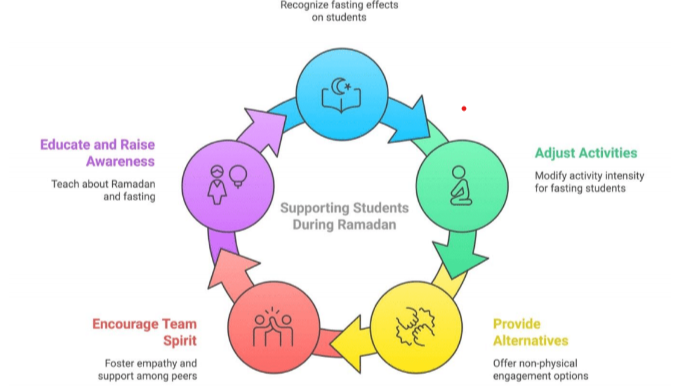As PE teachers, one of the key roles we play is fostering an inclusive environment for all students. This includes being mindful of cultural and religious events, such as Ramadan, which brings unique opportunities to support and engage our Muslim students in a positive and respectful way. During my time coaching in a sports academy in Qatar, I had the privilege of working with athletes observing Ramadan. This experience gave me valuable insights into how we, as teachers, can navigate this important month. Instead of viewing Ramadan as an obstacle, we should see it as an opportunity to build inclusion, empathy, and respect in our PE classes. Here are some strategies that worked well for me during this period:
1.Understand the Impact of Ramadan on Students
Ramadan is the ninth month of the Islamic lunar calendar, where Muslims fast from dawn until sunset. This means no food, drink, or even water during daylight hours. While fasting can present some challenges, it also encourages discipline, spiritual growth, and community spirit. Understanding how fasting affects students' energy, focus, and stamina enables us to be patient and adaptable in our approach to physical activity. It’s a time for both personal reflection and growth, and as teachers, we can support students through this important period in their lives.
2. Adjust the Intensity of Activities
During Ramadan, adjusting the intensity of physical activities can make a big difference. While some students may still want to engage in sports, their energy levels may fluctuate depending on when they last ate or drank. For example, try to avoid high-intensity games or practices during the hottest parts of the day or in the early morning, when students may still have several hours to go before breaking their fast. Focus on lower-intensity activities such as gymnastics, yoga, or skill-based drills, which keep students involved without overexerting them. This allows them to stay active, engaged, and part of the class without exhausting themselves.
3.Provide Alternatives for Physical Engagement
In schools with a mix of students observing Ramadan and those who do not, offering alternatives helps keep everyone engaged. Muslim students fasting might prefer activities that don’t require as much physical exertion. Shifting the focus to mental or educational aspects of sport—like strategy, teamwork, or coaching—can help ensure all students feel valued and included. This is also a great time to involve fasting students in leadership roles, where they can contribute to the class in a different, yet equally important, way. This creates opportunities for all students to participate, regardless of their physical involvement.
4. Encourage Team Spirit and Peer Support
Ramadan is a time for reflection, community, and empathy. Use this as an opportunity to promote teamwork and mutual support within your classes. Encourage students to be understanding of their fasting peers and to reinforce the importance of cooperation, respect, and empathy. Team spirit becomes especially important during this time, as fasting students may need additional encouragement and support from their peers. By fostering a positive and supportive environment, we help all students feel included, whether they’re engaging in physical activities or not.
5. Education and Awareness
Finally, Ramadan is a wonderful opportunity for all students to learn more about different cultures, traditions, and aspects of sport. Taking the time to educate your class about Ramadan can provide valuable lessons on nutrition, hydration, and fueling the body for both performance and recovery. This not only helps Muslim students feel understood, but also offers non-Muslim students a chance to learn and engage in meaningful conversations. A brief discussion or activity on Ramadan can enrich the classroom experience for everyone, while also offering insights into how fasting affects the body and mind during sport. By taking these practical steps, we can make our PE classes not only more inclusive for students observing Ramadan but also an opportunity to celebrate cultural and religious diversity. These adjustments help create an environment where all students can thrive—whether they are actively participating in physical activities or contributing in other ways.
Have you encountered any challenges or discovered successful strategies for including Muslim students during Ramadan in your PE classes? I’d love to hear your experiences!
Contributors

Martin Brockman
Director of Performance Pathways
Martin Brockman is Director of Brockman Athletics, providing teacher training and track and field teaching resources for schools around the world. Representing Great Britain in the decathlon for almost a decade, Martin achieved a bronze medal at the Commonwealth Games in Dehli, 2010. On retiring from his international career, he moved to the world-leading Aspire Academy in Qatar as the Head of Athlete Development where he designed and implemented the academy athletics program from talent identification through to international athletics.
Athletics
Specialisms
Share this post
Get fresh insights and articles straight to your inbox
By subscribing you agree to our privacy policy.



Comments
You must be signed in to comment